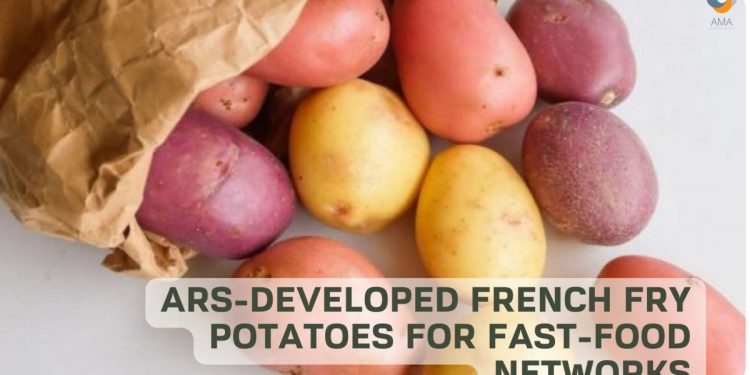ARS scientists released two new varieties of potatoes – ‘Clearwater Russet’ and ‘Blazer Russet’ – that will be used by McDonald’s for French fries. The company has a high criterion for its spuds, having accepted only seven varieties to use in its fries over the years.
With an annual farm value of USD4bn, the vast majority of potatoes are produced in the northern US States and are processed mostly into fries and chips. But potatoes are highly perishable, and the crop must be consumed, processed, or stored cold immediately after harvest.
The problem, however, is that cold storage can lead to an unacceptably dark coloring after processing that makes the potatoes unmarketable. The alternative is to increase production in warm areas of the southern US. But internal heat necrosis, an internal tuber defect that leads to brown spots, is a major problem in those areas.
The researchers then released the new potato varieties resistant to problems that develop during storage and heat necrosis. The new releases include the ‘Elkton’, a new chipping cultivar with high resistance to internal heat necrosis that is proving to be extremely popular among growers in the South.
The Southern US potato’s internal heat necrosis causes the death of flesh inside the potato tuber. ARS’s new potato variety, Elkton, is resistant to internal heat necrosis. Elkton was released by The Agricultural Research Service, U.S. Department of Agriculture, and the Agricultural Experiment Stations of Florida, Pennsylvania, New Jersey, and New York, The North Carolina Agricultural Research Service, and the Maine Agricultural and Forest Experiment Station in 2012. It is a round, white-skinned variety with resistance to internal heat necrosis that chips directly from the field in the south. This variety will benefit the potato chipping industry by making high-quality tubers free of internal defects available to processors during the late spring and mid-summer growing season.
Highland Russet is a potato variety with medium russeting of its tubers and is notable for its high marketable yield and tuber protein content (35% greater than Russet Burbank). It is suitable for the fresh market as well as processing into French fries and other frozen potato products with excellent fry color and a low incidence of sugar ends.
Clearwater Russet is a russet-skinned potato cultivar suitable for processing or fresh packing. It is notable for having a low incidence of external defects that contributes to its high US No 1 yield relative to the dual-purpose industry-standard, Russet Burbank. Clearwater Russet also has exceptional processing quality, with a low incidence of sugar ends and cold-induced sweetening resistance allowing it to be stored at a temperature of 7.2°C for up to 250 days without the need for reconditioning, with fry color from this storage regime being consistently at 1.0 (USDA Fry Color Scale).
This cultivar is also notable for its high tuber protein content, which was 35% greater than that of Russet Burbank. In full-season trials conducted over a three-year period in California, Colorado, Idaho, Oregon, and Washington, Clearwater Russet had total yields slightly lower than Ranger Russet and Russet Burbank, but averaged 2% and 30% higher US No. 1 yields, respectively, across all states.
The average specific gravity of Clearwater Russet is comparable to Ranger Russet and significantly higher than Russet Burbank. Clearwater Russet is resistant to potato virus X (PVX) and tuber late blight and is moderately resistant to Verticillium wilt, common scab, and the common strain of potato virus Y (PVYO).
Symptoms of infection with two necrotic strains of PVY were not observed in tubers of Clearwater Russet or Russet Burbank but were observed in Ranger Russet. Blackspot bruise reaction for Clearwater Russet is less pronounced than for either Ranger Russet or Russet Burbank.
The incidence of hollow heart in Clearwater Russet is intermediate between Ranger Russet and Russet Burbank. The internal brown spot has been noted as a problem for Clearwater Russet in the Columbia Basin of Oregon but has not been observed as problematic in other growing regions.
Clearwater Russet was released in 2008 by the USDA-ARS and the Agricultural Experiment Stations of Idaho, Oregon, and Washington, and is a product of the Pacific Northwest Potato Variety (Tri-State) Development Program.





